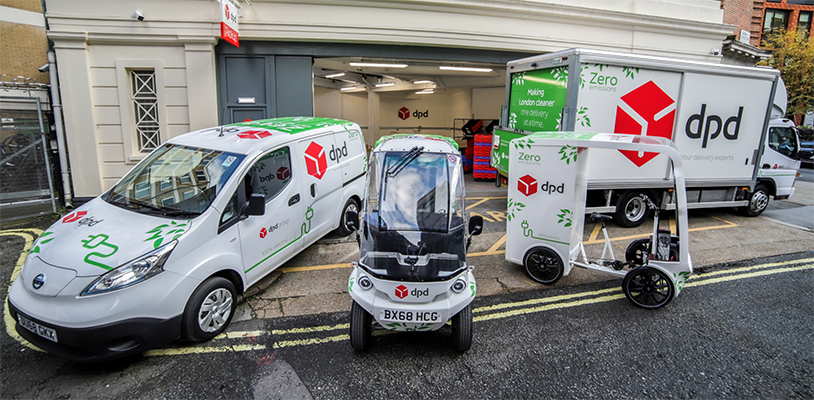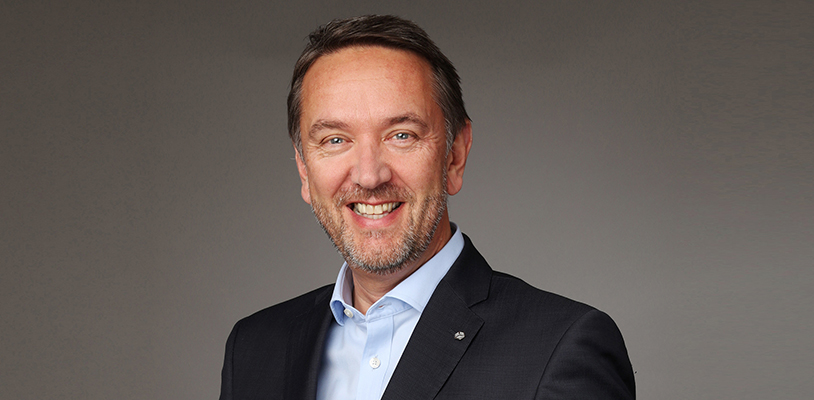Tell us more about DPD’s goals to become greener?
We want to be the greenest delivery company on the planet by transforming every aspect of our operation - from investing in electric vehicles and creating brand new smart urban delivery models to green packaging and initiatives to help recycle some of the goods we carry, like clothing. We are also investing in creative ways to improve our own energy and waste management.
We’re currently building the largest all-electric delivery fleet in the UK, in double-quick time! By the end of this year, we will have 600 electric vehicles on the road, which will be 10% of our fleet. We are using a range of vehicles from an e-cargo bike made partly from hemp fibres stuck together with a resin based on the oil from cashew nut shells, which we helped design, to 7.5-tonne electric trucks.
In January, we confirmed an order for 300 new electric Nissan e-NV200 vans, in what was the largest single UK commercial EV van order to date. They will all be on the road by May.
What are some of the challenges connected to achieving this?
The key challenge for delivery companies is to try and reduce emissions and congestion in our towns and cities, while still meeting the growing demand from online delivery customers. For us, that means inventing smarter urban delivery models that mean we can make fewer, shorter journeys and investing in clean, green, emission-free vehicles.
In 2018 we opened the UK’s first all-electric micro parcel depot in Westminster. We are developing a network of these micro-depots across central London to base our electric fleet closer to our end customers. Parcels are fed into the micro depots by electric 7.5t trucks, and the final mile deliveries are then made by our fleet of innovative all-electric vehicles including the Paxster and our unique e-cargo bike. Previously, we had a fleet of diesel vans travelling hundreds of miles across central London every day just to get to the start of their route.
The Westminster depot was a real game-changer for us. It is smart and it delivers tangible benefits in terms of reduced mileage and CO2. It is also great to be able to say that we deliver to Her Majesty the Queen and the Prime Minister with our electric vehicles. We also have two other all-electric sites in central London, where we’re aiming to have seven in total. Once they are done, we will then roll-out the model across the rest of the country.
When do you think you would have achieved your end goal by?
We are a very fast-moving operation with a track record of investing millions of pounds on innovation and infrastructure over the last ten years, however, this is a very different challenge. Personally, I would like things to be done a lot, lot quicker, but there are significant challenges and we are reliant on a lot of third parties.
In recent years, we have been buying 1,000 new 3.5t delivery vans as our business grows. This is the workhorse of the parcel delivery industry, but until very recently, right-hand drive electric versions simply weren’t available. We’ve just managed to secure the first 100 MAN eTGE 3.5t vans in the UK, but we would buy far more if they were available. We are talking to all the major vehicle manufacturers, but it could still be years before we really have the kind of availability we’re aiming for.
We have similar challenges connected to finding sites in inner-city areas for parcel depots. Warehouse and distribution spaces have been priced out of city centres and sites are often prioritised for residential purposes. We are being creative in our thinking, repurposing under-utilised and unoccupied buildings, but even then, the legal process to get approval is ridiculously arduous and time-consuming.
In the long term, multi-use or multi-level warehousing is becoming the only solution for industrial property developers to make feasible cases for the redevelopment of city-centre locations. The planning process needs to be more holistic. If you want people living in city centres, you need to work out how to service their needs in a sustainable way.

DPD’s micro-depot at Westminster and some of the electric vehicles based there.
What innovations are you planning for the supply chain of the company?
We’ve been looking at every aspect of our operation and challenging ourselves to do better. For example, getting our drivers’ handheld units to guide them to every address using the shortest possible route. These units have been another massive investment for us – both financially and in terms of the work required to integrate them into the operation in the most effective way possible.
But this means that our drivers are super-efficient on their routes every single day which results in travelling fewer miles and generating less CO2. It translates into driving 649,000 fewer miles.
Every year, we provide 36 million shipping bags to protect our customers’ goods. We’ve been working with them to reduce the number of bags used, but we’ve also been able to make a major change to the bags themselves.
In 2018, we set out to create a 100% recyclable bag, which we developed with specialist provider Provoas. Unfortunately, when we tested it, the original material was too flimsy to carry items securely. Eventually, we found the right solution – a bag made from 80% reclaimed material which was 100% recyclable. It is made from waste from the agricultural industry which would otherwise end up in a landfill.
We’ve also found a smart way of recycling the shrink wrap we use in our operations. Last year we recycled 150 tonnes of it, which is bailed at our central hub and then reprocessed into raw material. We can then sell that and the money raised is added to our Eco Fund which supports green initiatives across the UK.
Why is it important for more delivery companies to become more sustainable?
We are very aware of our responsibilities to the other people we share the roads, towns, cities and our planet with. DPD is the leader in our industry, which puts us in the best position to inspire change on big issues like sustainability.
In 2019 we issued a White Paper calling on vehicle manufacturers, energy providers, national and local governments to start working together to tackle the barriers holding back more widespread EV adoption and investment.
We are a scale operator, so even the small changes we make can have a huge cumulative impact.
We send a quarter of a billion Predict one-hour delivery notifications each year to let customers know when to expect us. Over 6 million of them now use the DPD app to micro-manage their delivery preferences and tell us exactly how they want their parcel to be delivered if they aren’t going to be in. That could be to leave it in a special safe place, with a specific neighbour or to drop it into their favourite DPD Pickup parcel shop.
The end result is that we are now delivering 99.8% of all parcels the first time. That’s a massive 4.5 million extra return journeys avoided or 3.5 million fewer miles travelled and 1.233 tonnes of CO2 not being needlessly generated.
In addition to this, we know how important these issues are to our retail customers. We work side by side with the biggest names on the high street and some fantastically innovative online retailers and we know that they are as passionate about reducing their carbon footprint as we are. I think by working together like this, we are inspiring each other to do more. When our partners see the commitment we are making, it inspires numerous fascinating discussions and really interesting initiatives, which help drive the right behaviours in both organisations.











